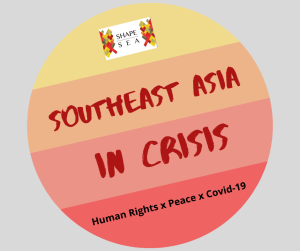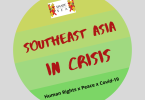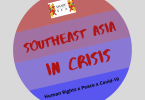Dr. Pardis Moslemzadeh TehraniFaculty of Law, University of Malaya
 The outbreak of the COVID-19 coronavirus obliges all governments and relevant actors to ensure that international human rights laws and standards are at the centre of their responses in the effort to best protect public health and support those most at risk of adverse impacts. (Amnesty International, 2020) At the time of this writing, there were 375,498 confirmed cases of COVID-19 and 16,362 deaths in more than 196 countries. (World Health Organization, 2020) This document provides an overview of state obligations under international human rights laws posed by the coronavirus outbreak. State obligations include but are not limited to imposing restrictions while ensuring the protection of relevant human rights, provision of health facilities, freedom of expression and information, assistance to victims, and victims ™ rights to be helped (humanitarian assistance).As the number of infected persons continues to soar, Michelle Bachelet, the UN High Commissioner for Human Rights, declared on 6th March the importance of introducing measures to check the spread of the COVID-19 as one of the obligations of states. The outbreak which started in January 2020 placed several countries in an emergency situation leading them to declare a lockdown situation. Many countries, including those in South East Asia, have enforced restrictions, although some still refuse to do so in violation of basic human rights principles. Currently, countries with major outbreaks such as the United States, China, South Korea, Italy, Japan and Germany have imposed lockdown emergency situations while Iran, despite having a high number of infected cases, is unwilling to impose any controls in a serious breach of human rights. (UNOCHR, 2020)Given that the COVID 19 outbreak has been declared a global pandemic, governments have been urged by various international organizations such as the WHO and UN to take urgent and aggressive action to stop the spread of the virus. By virtue of the universal concept of human rights, states are obliged to comply with such requests at all times especially during situations of emergency and conflict. They are also required to refrain from interfering with or curtailing the enjoyment of human rights and to protect individuals and groups against human rights abuses. (Diankonia, 2020)Denial of humanitarian assistance also constitutes a crime against humanity. Iran, which is among the countries having the worst coronavirus outbreaks in the world, has refused to accept international aid such as offered by the Doctors Without Borders/Médecins Sans Frontières (MSF) a leading international medical humanitarian organization. (Foxnews, 2020) Crimes against humanity is defined as acts committed against any civilian population in a widespread or systematic manner that are based on any policies by states, organizations, or groups. (ICTY, Art. 5, 2009) An inadequate response to disasters, either by a deliberate act or omission, such as a denial of humanitarian aid to victims which create inhumane conditions leading to their death constitutes a crime against humanity. In fact, refraining from taking action or refusing to accept humanitarian aid thereby exposing victims to hazardous risks is as likely to increase the number of deaths and compromise the living conditions of those struggling for basic necessities. Denial of aid can be just as serious as physical violence. Careful attention to human rights standards, besides the obligations of governments to impose such measures, can provide an effective response amidst the turmoil and disruption that inevitably results in a state of emergency, as is being faced with Covid-19, and limit any dire consequences. (Venturini, 2012)According to the International Covenant on Economic, Social and Cultural Rights (ICESCR), which has been adopted by most countries, everyone has the right to the highest attainable standard of physical and mental health. The ICESCR obliges states to take necessary measures for the prevention, treatment and control of epidemic, endemic, occupational and other diseases. The ICESCR committee which monitors state compliance with the covenant has stated that The right to health is closely related to and dependent upon the realization of other human rights, as contained in the International Bill of Rights . The International Covenant on Civil and Political Rights (ICCPR) also requires state restrictions on this right to be lawful, necessary, and proportionate. Under international human rights laws, governments have an obligation to protect the right to freedom of expression, including the right to seek, receive, and impart information of all kinds, regardless of frontiers. The governments of some countries such as China, Iran and Thailand have failed to uphold the right to freedom of expression regarding the onset of the virus which has undermined public trust in their actions. Others, such as Taiwan, Singapore, South Korea and Italy prioritized communication and transparent reporting on the number of infected cases. China and South Korea are the only states with large outbreaks that have managed to flatten the curve of new infections by imposing draconian restrictions on speech and movement. (Fisher & HunHow, 2020)According to the new guidance from UNAIDS, responding to an epidemic is not a question of balancing public health and human rights but rather require states to adhere to human right principles. Respect for human right and community leadership are the key responses to global epidemic which led to success. The biggest inroads in reducing the impact of HIV have done by countries adopting approaches that empower communities to screen, test and seek treatment if necessary and to protect themselves and others from acquiring the virus. (UNAIDS 2020)BibliographyAmnesty International. (2020, March 16). Responses to covid-19 and states ™ human rights obligations: Preliminary observations. Cited March 25, 2020.Fisher. M & HunHow, C.S. (23 March 2020). South Korea Flattened the Curve. Cited 27 March 2020.McKay, H. (2020, March 25). Iran rejects international humanitarian aid despite coronavirus death toll. Cited March 27, 2020.The Global International Humanitarian Law Centre of Diakonia, International Humanitarian Law. Cited March 27, 2020.UNAIDS 2020. (20 March 2020). Rights in the time of COVID-19: Lessons from HIV for an effective, community-led response. Cited 27 March2020.United Nations Human Rights: Office of High Commissioner (UNOHCHR). (2020, March 25). Urgent action needed to prevent COVID-19 Rampaging through places of detention “ Bachelet Cited March 27, 2020.Updated Statute of The International Criminal Tribunal for the Former Yugoslavia (ICTY), Art. 5, of the ICTR, Art. 3, and of the ICC, Art. 7.1 and 7.2(a). See also the 1996 ILC Draft Code of Crimes, op. cit. (note 19), Art. 18, and the jurisprudence of the ICTY and the ICTR.Venturini, G. (2012). International Disaster Response Law. Guttry, A et al (Ed). TMC Asser press.World Health Organization. (2029, March 25). Coronavirus disease (COVID-19) Pandemic. Cited 25 March 25, 2020.
The outbreak of the COVID-19 coronavirus obliges all governments and relevant actors to ensure that international human rights laws and standards are at the centre of their responses in the effort to best protect public health and support those most at risk of adverse impacts. (Amnesty International, 2020) At the time of this writing, there were 375,498 confirmed cases of COVID-19 and 16,362 deaths in more than 196 countries. (World Health Organization, 2020) This document provides an overview of state obligations under international human rights laws posed by the coronavirus outbreak. State obligations include but are not limited to imposing restrictions while ensuring the protection of relevant human rights, provision of health facilities, freedom of expression and information, assistance to victims, and victims ™ rights to be helped (humanitarian assistance).As the number of infected persons continues to soar, Michelle Bachelet, the UN High Commissioner for Human Rights, declared on 6th March the importance of introducing measures to check the spread of the COVID-19 as one of the obligations of states. The outbreak which started in January 2020 placed several countries in an emergency situation leading them to declare a lockdown situation. Many countries, including those in South East Asia, have enforced restrictions, although some still refuse to do so in violation of basic human rights principles. Currently, countries with major outbreaks such as the United States, China, South Korea, Italy, Japan and Germany have imposed lockdown emergency situations while Iran, despite having a high number of infected cases, is unwilling to impose any controls in a serious breach of human rights. (UNOCHR, 2020)Given that the COVID 19 outbreak has been declared a global pandemic, governments have been urged by various international organizations such as the WHO and UN to take urgent and aggressive action to stop the spread of the virus. By virtue of the universal concept of human rights, states are obliged to comply with such requests at all times especially during situations of emergency and conflict. They are also required to refrain from interfering with or curtailing the enjoyment of human rights and to protect individuals and groups against human rights abuses. (Diankonia, 2020)Denial of humanitarian assistance also constitutes a crime against humanity. Iran, which is among the countries having the worst coronavirus outbreaks in the world, has refused to accept international aid such as offered by the Doctors Without Borders/Médecins Sans Frontières (MSF) a leading international medical humanitarian organization. (Foxnews, 2020) Crimes against humanity is defined as acts committed against any civilian population in a widespread or systematic manner that are based on any policies by states, organizations, or groups. (ICTY, Art. 5, 2009) An inadequate response to disasters, either by a deliberate act or omission, such as a denial of humanitarian aid to victims which create inhumane conditions leading to their death constitutes a crime against humanity. In fact, refraining from taking action or refusing to accept humanitarian aid thereby exposing victims to hazardous risks is as likely to increase the number of deaths and compromise the living conditions of those struggling for basic necessities. Denial of aid can be just as serious as physical violence. Careful attention to human rights standards, besides the obligations of governments to impose such measures, can provide an effective response amidst the turmoil and disruption that inevitably results in a state of emergency, as is being faced with Covid-19, and limit any dire consequences. (Venturini, 2012)According to the International Covenant on Economic, Social and Cultural Rights (ICESCR), which has been adopted by most countries, everyone has the right to the highest attainable standard of physical and mental health. The ICESCR obliges states to take necessary measures for the prevention, treatment and control of epidemic, endemic, occupational and other diseases. The ICESCR committee which monitors state compliance with the covenant has stated that The right to health is closely related to and dependent upon the realization of other human rights, as contained in the International Bill of Rights . The International Covenant on Civil and Political Rights (ICCPR) also requires state restrictions on this right to be lawful, necessary, and proportionate. Under international human rights laws, governments have an obligation to protect the right to freedom of expression, including the right to seek, receive, and impart information of all kinds, regardless of frontiers. The governments of some countries such as China, Iran and Thailand have failed to uphold the right to freedom of expression regarding the onset of the virus which has undermined public trust in their actions. Others, such as Taiwan, Singapore, South Korea and Italy prioritized communication and transparent reporting on the number of infected cases. China and South Korea are the only states with large outbreaks that have managed to flatten the curve of new infections by imposing draconian restrictions on speech and movement. (Fisher & HunHow, 2020)According to the new guidance from UNAIDS, responding to an epidemic is not a question of balancing public health and human rights but rather require states to adhere to human right principles. Respect for human right and community leadership are the key responses to global epidemic which led to success. The biggest inroads in reducing the impact of HIV have done by countries adopting approaches that empower communities to screen, test and seek treatment if necessary and to protect themselves and others from acquiring the virus. (UNAIDS 2020)BibliographyAmnesty International. (2020, March 16). Responses to covid-19 and states ™ human rights obligations: Preliminary observations. Cited March 25, 2020.Fisher. M & HunHow, C.S. (23 March 2020). South Korea Flattened the Curve. Cited 27 March 2020.McKay, H. (2020, March 25). Iran rejects international humanitarian aid despite coronavirus death toll. Cited March 27, 2020.The Global International Humanitarian Law Centre of Diakonia, International Humanitarian Law. Cited March 27, 2020.UNAIDS 2020. (20 March 2020). Rights in the time of COVID-19: Lessons from HIV for an effective, community-led response. Cited 27 March2020.United Nations Human Rights: Office of High Commissioner (UNOHCHR). (2020, March 25). Urgent action needed to prevent COVID-19 Rampaging through places of detention “ Bachelet Cited March 27, 2020.Updated Statute of The International Criminal Tribunal for the Former Yugoslavia (ICTY), Art. 5, of the ICTR, Art. 3, and of the ICC, Art. 7.1 and 7.2(a). See also the 1996 ILC Draft Code of Crimes, op. cit. (note 19), Art. 18, and the jurisprudence of the ICTY and the ICTR.Venturini, G. (2012). International Disaster Response Law. Guttry, A et al (Ed). TMC Asser press.World Health Organization. (2029, March 25). Coronavirus disease (COVID-19) Pandemic. Cited 25 March 25, 2020.





